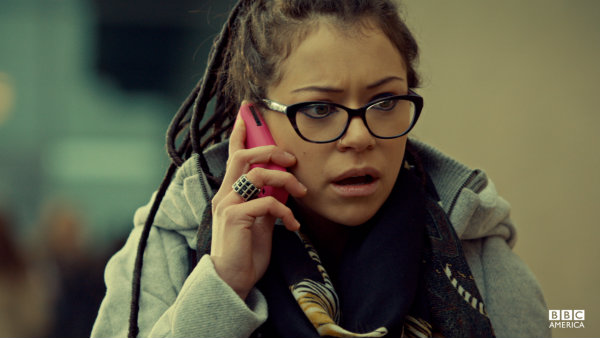Review: Orphan Black, Season One
Tatiana Maslany Stars in BBC America's Latest Breakthrough Show

If you are looking for an antidote to mega-budget apocalyptic movies where poorly developed characters compete for screen time with bloodless special effects that all seem to rely on the shock of 9/11’s World Trade Center tragic imagery, then Orphan Black is the television series for you. If you don’t know it already — you will.
Sarah (Tatiana Maslany) is a troubled twenty-something foster kid turned petty crook trying to pull her life together by reuniting with her young daughter. Along the way she witnesses the suicide of a woman named Beth, who looks exactly like her. With nothing to lose she assumes Beth’s identity and finds herself over her head in troubles that includes a deadly scientific conspiracy and a lot of young women look-a-likes.
The series, created by Graeme Manson and John Fawcett, is thrilling, comical, and strange. Its gritty, visceral, narrative grounded in realism hews close to the bone, keeping us, like Sarah, tightly in the bind of unfolding events. It also never hides behind its intriguingly geeky premise. If Lost and Fringe were disappointing when they veered off into esoteric speculative science, Orphan Black is more like Breaking Bad, where concept never trumps character.
At the center of the drama is the mind-boggling performance of Canadian actress Tatiana Maslany. Her face was born to express the widest range of dramatic and comic emotions, and here she seems to be having her transformative moment, like Claire Danes in Homeland or Rooney Mara in The Girl with the Dragon Tattoo. She should be getting paid per character (and there are expected to be many more to come) in this career-changing tour de force role. Maslany has said that she listens to different music playlists to differentiate between the various characters she portrays.
Spoilers aside, suffice it to say that the speculative premise here is on a par with the Supreme Court’s recent rejection of Myriad Genetics’ claim of patents relating to BRCA1 and BRCA2 gene mutations and the “Immortal Cells of Henrietta Lack.” Futurism has taken a hit in science fiction as our present has outstripped it. Orphan Black finds the right balance between concept and characters. After all, this isn’t a concept or story we haven’t heard, yet the characters always surprise us.
Taking place in a North American Generica (A.K.A. Toronto, Canada), the story follows Sarah as she tries to keep ahead, just barely, of the multiple forces pursuing her — from her lowlife ex-boyfriend to the scientific organization responsible for her ever-surprising multiples to the police force for which her suicidal doppelganger worked. And although this is a journey of personal discovery, Sarah never loses sight of who she is or how she feels. As the first season progresses we begin to learn how important Sarah’s daughter is, and in the process every familial relationship comes under suspicion. There’s also a sense of darkness about genetic relationships that have been tampered with.
The only sour note in casting here is the pretty boy Afghanistan war op who’s motivations seem too quick to change and is too beefcake for the earthy Sarah. And I just wish her brother would get a better lock on that damn loft door of his. (With so many villains about you need a decent lock bolt, at least.)
This summer has helped confirm that television — not the multiplex — is where the best moving picture storytelling is being done. The series exists in the new web-based world of Internet television, and it’s guaranteed to have the Nielsen people scratching their heads. You can find free episodes on BBC America On Demand, or buy season passes on iTunes, Amazon, Netflix, XBOX Live, Google Play, and Sony PSN. This is an ingeniously designed, genre-crossing epic coming into shape where you even root for the nasty ones to survive. Although we’ve all joined the ranks of binge viewership, I’d suggest you take your time savoring Orphan Black; you’ll have to wait until spring 2014 for the second season.



